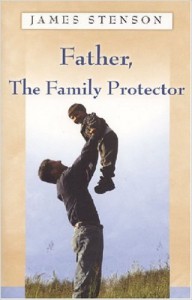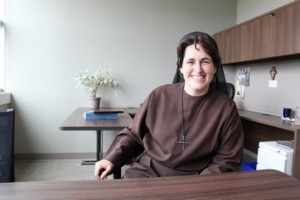The very first Sunday I was here, a year and a half ago, I experienced something I never experienced before. I had been a priest for eight years, but the moment I became your pastor, I felt I had to protect you. I wrote on my blog: “I’ve noticed that I feel a great love and concern for the people here, and really want to love them in everything I do—I’ve never felt this paternal instinct to such a strong degree, which I think is a gift from God.” (This is why I sometimes bring up hard topics or challenge you, not to hurt, but to protect. Sorry if it’s hard, but I do it with the best of intentions.)
One thing I’ve noticed in working with so many parents, especially at our school, is that they’re very protective of their children. If something threatens their children, whether it’s bullying, unfairness, mistreatment, etc., their guard goes up. This is a wonderful thing and illustrates how we all have a protective instinct for those we love.
Jesus says today, “My sheep hear my voice… No one will snatch them out of my hand. What my Father has given me is greater than all else, and no one can snatch it out of the Father’s hand” (Jn 10). It speaks to the fact that Jesus protects us, especially from evil and sin, and I feel so grateful for His protection. Love protects the beloved.
We’re all called to grow in our protective instinct and I’d like to suggest two ways God is calling us to do this.
 1) Husbands protecting their wives: I’m not sure how many families this one applies to, so we can decide if and how much this one applies to ours. I only mention it because I’ve heard it a number of times from different sources so it seems to be an issue. Dr. Ray Guarendi writes: “In counseling and in conversation, I’m hearing a similar refrain from more women: They are the lead authorities in their homes. They do most of the disciplining, enforce the bulk of the rules, and set the higher expectations for the kids… While Mom does the lioness’s share of the discipline, [many dads] hang back, letting her take the brunt of the kids’ resistance or, worse yet, undercutting her. Perhaps they disagree with her decision or style or are aiming to be peacemakers… Men, would you passively stand by as another adult verbally mistreated your wife?… Would it not be reasonable then for you to stand up to your kids and defend your wife? Envision the scene. Your wife and child are locked in a bicker fest. You’re tempted to remain buried in the recliner, all the while thinking, ‘If I close my eyes, I can’t tell which is the twelve-year-old.’ Resist that temptation. Get up. Get in there. Get involved. In a word, protect… Step in and stop that child from harassing your wife. Don’t use feeble words like, “Is that how you talk to your mother?’ or, ‘You watch your mouth, young man,’ or the really wimpy, ‘Don’t make me come in there.’ Take action. Not only will you enhance your image as a man, but you will respect hers as a woman… Your action will ring loud: ‘I value you enough to defend you. I will protect something that means much to you, your motherhood” (Marriage: Small Steps, Big Rewards, 95-97).
1) Husbands protecting their wives: I’m not sure how many families this one applies to, so we can decide if and how much this one applies to ours. I only mention it because I’ve heard it a number of times from different sources so it seems to be an issue. Dr. Ray Guarendi writes: “In counseling and in conversation, I’m hearing a similar refrain from more women: They are the lead authorities in their homes. They do most of the disciplining, enforce the bulk of the rules, and set the higher expectations for the kids… While Mom does the lioness’s share of the discipline, [many dads] hang back, letting her take the brunt of the kids’ resistance or, worse yet, undercutting her. Perhaps they disagree with her decision or style or are aiming to be peacemakers… Men, would you passively stand by as another adult verbally mistreated your wife?… Would it not be reasonable then for you to stand up to your kids and defend your wife? Envision the scene. Your wife and child are locked in a bicker fest. You’re tempted to remain buried in the recliner, all the while thinking, ‘If I close my eyes, I can’t tell which is the twelve-year-old.’ Resist that temptation. Get up. Get in there. Get involved. In a word, protect… Step in and stop that child from harassing your wife. Don’t use feeble words like, “Is that how you talk to your mother?’ or, ‘You watch your mouth, young man,’ or the really wimpy, ‘Don’t make me come in there.’ Take action. Not only will you enhance your image as a man, but you will respect hers as a woman… Your action will ring loud: ‘I value you enough to defend you. I will protect something that means much to you, your motherhood” (Marriage: Small Steps, Big Rewards, 95-97).
 A 13-year old, the oldest of six or seven children, was once sitting at the dinner table with his family. His mother corrected him on something he was doing and he shot back with a rude comment, entirely inappropriate, especially to one’s mother and in front of the whole family. He realized he made a mistake as soon as he said it, but his dad had already got up and said, “Come outside, Pat, I want to have a few words with you.” They sat down next to each other, both looking ahead. His father said, “Listen, there’s something I want you to understand: That woman is not just your mother, she’s my wife, she’s my lover, she’s my sweetheart, she is the reason God put me here on earth. I mean, I won life’s lottery the day I met her, and I won it again the day she agreed to be my wife. And I am absolutely dedicated to her happiness and to her welfare. Now I want you to understand this: If you treat my wife with disrespect, I’m going to come after you and give you a lesson you will never ever forget. I’m going to let it go this time, with just a warning. This is a warning ticket. Okay? See, you guys have to understand something: I married her, not you guys. You guys just kind of came along, and I can make more of you. So let’s go inside and apologize.” He went in and apologized and Mom accepted the apology. When he grew up, he told his teenagers the same thing (James Stenson, Unified Parent Leadership, Part I, 33:43).
A 13-year old, the oldest of six or seven children, was once sitting at the dinner table with his family. His mother corrected him on something he was doing and he shot back with a rude comment, entirely inappropriate, especially to one’s mother and in front of the whole family. He realized he made a mistake as soon as he said it, but his dad had already got up and said, “Come outside, Pat, I want to have a few words with you.” They sat down next to each other, both looking ahead. His father said, “Listen, there’s something I want you to understand: That woman is not just your mother, she’s my wife, she’s my lover, she’s my sweetheart, she is the reason God put me here on earth. I mean, I won life’s lottery the day I met her, and I won it again the day she agreed to be my wife. And I am absolutely dedicated to her happiness and to her welfare. Now I want you to understand this: If you treat my wife with disrespect, I’m going to come after you and give you a lesson you will never ever forget. I’m going to let it go this time, with just a warning. This is a warning ticket. Okay? See, you guys have to understand something: I married her, not you guys. You guys just kind of came along, and I can make more of you. So let’s go inside and apologize.” He went in and apologized and Mom accepted the apology. When he grew up, he told his teenagers the same thing (James Stenson, Unified Parent Leadership, Part I, 33:43).
2) Let’s protect our children. First, let’s drive safely around the school zone during drop-off and pick-up. There have been so many close calls with cars disobeying the school traffic guidelines, driving dangerously, double parking, taking risks, etc. Even I’ve almost been hit! One day, someone’s going to get hurt. It’s not worth it. Safety comes first. Can we do that, please? Thank you!
Next: In his 2014 Lenten message, Pope Francis wrote, “How much pain is caused in families because one of their members—often a young person—is in thrall to alcohol, drugs, gambling or pornography!” It’s this last one I want to focus on. The United States Conference of Catholic Bishops wrote a statement on pornography last November, the CWL every year writes a petition against pornography, and even last Friday, a religious sister, who’s also a counselor, told me that pornography is a plague and an epidemic.
Some people might sincerely ask, “Father, do we really need to talk about this?” The truth is: society’s vision is influencing them more than ours. We mentioned in August that “9 out of 10 boys are exposed to pornography before the age of 18,” while it’s 6 out of 10 for girls. If our children follow the statistics, this is what will happen to them. And let me ask you, do you think the cultural trend on sexuality is getting better or worse? Our younger children are going to have a harder time with this than we did.
Here are some solutions: first, bishops, priests and deacons have to show stronger leadership on this and be more bold in talking about this.
Next, we need to have crystal-clear moral judgements on the wrongness of pornography. Sexuality is beautiful, a gift from God! Because it’s sacred and can do so much good, any violation of it causes great harm to the human person. Pornography cheapens sex and makes it a form of lust and entertainment. Men who watch it get emasculated, meaning they’re robbed of their masculinity: rather than sacrificing themselves for the beloved, they use a person for themselves. Neurologically, a man’s brain will expect women to live up to his fantasies, and when you get married, this is unbearable for a wife; she can’t live up to a fantasy. It ruins one’s ability to bond and commit, and we become selfish. People also get very addicted, trying to maintain a high, and are not able to say ‘No.’
Because of the damage it does, it is grave matter for sin. This means: if I deliberately look at pornography or give/send/show it to someone else, and I know it’s wrong, then I commit a mortal sin. A mortal sin is something freely chosen, so contrary to God’s plan, so damaging to a person, that if I die in a state of mortal sin and haven’t repented, then I choose to go to hell. We’re putting our soul in danger. Now that we all know, from now on, if we look at pornography on purpose (not accidentally saw something (unintended)), then we can’t receive Communion, but have to go to Confession first.
I want our kids to know this. Why? Because, if we follow the statistics on this, they will be exposed to pornography at some point when we’re not with them, and, when that happens, their first response should be a moral judgement: “Whoa, this is bad stuff. I’m not going any further. I don’t want to commit a mortal sin.” Their guard will be up. Typically, when young people see pornography, they’re intrigued, and, while a part of them knows it’s wrong, their curiosity draws them deeper and deeper often until they’re hooked and can’t break free. No one ever told them clearly that this was a mortal sin so their guard was down.
It’s important to note that, if we are struggling or have struggled with pornography, this doesn’t mean we’re bad people; quite often no one ever told us, so we got into it young. If what we’re hearing bothers us, it’s a sign that we have a good conscience and that we’re good people. Please remember that God loves us, His mercy is greater than our sin, we’re not alone (many people are struggling with it), God’s grace can help us get over this, and we should never ever stay away from Confession. Let’s not be afraid of coming back again and again, because repeatedly confessing our sins is part of how we get over them. The devil wants us to stay away from Confession; God wants us to return home to strengthen us. Lots of Catholics have been saved from pornography.
 Next, Matt Fradd asks us Catholic parents which filter we have for our computers at home and for our children’s phones? He doesn’t ask if we have a filter, but which one? Because it’s not that our children will go out looking for it, but porn companies are looking for our children. They set up sites so that when children make innocent searches online, lo and behold something bad pops up. He says that two of the best filters are Covenant Eyes and Net Nanny. We pay for them because they’re good. Free filters are often inadequate, which is why they’re free. We need to have complete access to our kids’ cell phones, along with the passwords, with ways of recording everything they do on them. The onus is on us to teach children and monitor their behaviour.
Next, Matt Fradd asks us Catholic parents which filter we have for our computers at home and for our children’s phones? He doesn’t ask if we have a filter, but which one? Because it’s not that our children will go out looking for it, but porn companies are looking for our children. They set up sites so that when children make innocent searches online, lo and behold something bad pops up. He says that two of the best filters are Covenant Eyes and Net Nanny. We pay for them because they’re good. Free filters are often inadequate, which is why they’re free. We need to have complete access to our kids’ cell phones, along with the passwords, with ways of recording everything they do on them. The onus is on us to teach children and monitor their behaviour.
Lastly, we have these amazing presentations, “Human Growth and Development,” every year for parents of our school children; they’re about teaching the beauty of sexuality to our children. We’re all so busy so the turnout hasn’t always been great. Next September, they’ll be mandatory for parents of all students in Grades 4,6, and 7. We must hear the message repeatedly so that it’s part of our healthy Catholic culture. And all parishioners are welcome to attend too.
 I love what John Cardinal O’Connor, the late bishop of New York, said when there was a problem: “Not in my diocese.” He wouldn’t let a huge problem enter his home. I’d like to do the same things here: “Not in my parish.” And you can do it too: “Not in my home!” It’s a beautiful and romantic thing when a husband stands up for his wife. That’s what Jesus does for His bride, the Church. Love protects the beloved.
I love what John Cardinal O’Connor, the late bishop of New York, said when there was a problem: “Not in my diocese.” He wouldn’t let a huge problem enter his home. I’d like to do the same things here: “Not in my parish.” And you can do it too: “Not in my home!” It’s a beautiful and romantic thing when a husband stands up for his wife. That’s what Jesus does for His bride, the Church. Love protects the beloved.
